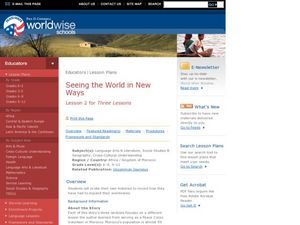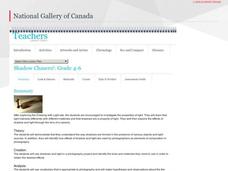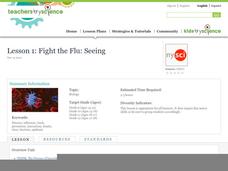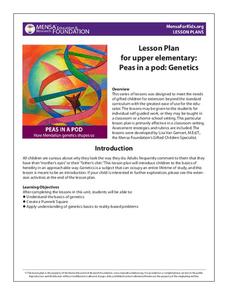Quizlet
Quizlet
Bring your class's study skills into the 21st century with this digital teaching tool. Offering an easy way to create and share customized sets of flash cards with students, parents, and other educators, this resource is a...
Curated OER
Seeing the World in New Ways
Learners examine their own history to expand how they examine the world. They research being a Peace Corps volunteer in Morocco. They also examine Muslim culture.
Berkshire Museum
Adopt a Schoolyard Tree
Help young scientists connect with nature and learn about trees with a fun life science lesson. Heading out into the school yard, children choose a tree to adopt, taking measurements, writing descriptions, and drawing sketches of it in...
National Gallery of Canada
Shadow Chasers!
Experiment with light and shadow with a photography lesson. Learners first view several artistic photographs. They then play with different levels of light and various objects, eventually putting together compositions and taking pictures...
Curated OER
The Old Man and the Sea: The K-W-H-L Strategy
Make note of what readers know, what to know, and have learned during a unit on Ernest Hemingway's The Old Man and the Sea. As class members read the book, they jot down their ideas on a KWHL chart, and consider what they have...
Willow Tree
Graphing
So many methods and so little time! The efficient method of graphing a linear equation depends on what information the problem gives. Pupils learn three different methods of graphing linear equations. They graph equations using...
Do2Learn
Ending A Conversation
Sometimes beginning a conversation isn't the hard part—it's ending the conversation that can be challenging. Autistic and mainstream learners alike can benefit from a resource that provides a reference handout with ways to end a...
NOAA
Climate, Weather…What’s the Difference?: Make an Electronic Temperature Sensor
What's the best way to record temperature over a long period of time? Scholars learn about collection of weather and temperature data by building thermistors in the fourth installment of the 10-part Discover Your Changing World series....
Curated OER
Fluency Passages, 3rd Grade
What would it be like to travel in a covered wagon? Learn about the life of a pioneer with a short informational reading passage. Kids read four paragraphs about traveling in a covered wagon and how it is different than traveling today,...
Illinois Department of Natural Resources
Section One: What is Biodiversity?
Four intriguing and scientific activities invite learners to explore the natural resources of their town. The activities cover concepts such as genetic traits, organizing species in a taxonomy, the differences between different species...
Museum of Disability
Buddy, The First Seeing Eye Dog
Learn about how the seeing eye dog program began with a reading lesson about Eva Moore's chapter book, Buddy, The First Seeing Eye Dog. With vocabulary words, discussion questions, and extension resources, the lesson is a...
Teach Engineering
Go Public: Osteoporosis Brochure
Osteoporosis and family — notice the connection between the two. Pairs develop a brochure to educate the public about osteoporosis in the last portion of the six-part series. The teams draw on the information learned throughout the...
American Museum of Natural History
Being An Anthropologist: Laurel Kendall
Imagine studying Korean culture, especially the role of women, as well as marriage and religious rituals from home! Anthropologist Laurel Kendall shares what she has learned from her many trips to this fascinating country half a world away.
Smithsonian Institution
Mary Henry: Journal/Diary Writing
A great way to connect social studies with language arts, a resource on Mary Henry's historical diary reinforces the concepts of primary and secondary sources. It comes with an easy-to-understand lesson plan, as well as the reference...
CK-12 Foundation
Latitude, Longitude, and Direction: Angle from the Equator
Which has the higher IQ, latitude or longitude? Longitude because it has 360 degrees! The interactive introduces the way latitude is measured and why it can never have more than 90 degrees. A handful of challenge questions encourage...
Cornell University
Sound Waves
How does sound travel through different mediums? Scholars explore this question by creating and observing sound waves as they learn the difference between transverse and longitudinal wave motion. Using their new knowledge, class members...
Howard Hughes Medical Institute
Human Skin Color: Evidence for Selection
Skin color is controlled by at least six genes. Young scientists learn about skin colors through a documentary. They discuss the topics of pigment, natural selection, and vitamin D absorption. They apply their knowledge to higher order...
Curated OER
Lesson 1: Fight the Flu: Seeing
The flu has been a deadly epidemic many times in the past. By examining technological innovations throughout history, then simulating the spread of disease from person to person through a classroom investigation, and finishing up with...
Berkshire Museum
Meet a Naturalist: Researching, Writing, Interviewing
Young scholars reach out into the community and learn about different environmental science careers in this inquiry-based instructional activity. Beginning with a short research assignment, children gain background knowledge about...
MENSA Education & Research Foundation
Peas in a Pod: Genetics
Can peas have grandparents? Learn about inherited traits and heredity with a set of activities focused on Mendelian genetics. As your class learns about the process of passing traits along in Punnett squares, they take on the role of...
Teach Engineering
Skin and the Effects of Ultraviolet Radiation
Though UV radiation can damage skin, it isn't all bad. The third installment in a six-part series allows the class to study the structure and function of skin. They learn about the different types of skin cancer and the SPF rating...
University of Kansas
Feelings - Thematic Unit
Boost language skills with a unit all about feelings. Scholars from all grade levels take part in several lessons that incorporate specific vocabulary terms and adjectives while discussing their feelings with their peers. Reading...
Ford's Theatre
How Perspective Shapes Understanding of History
The Boston Massacre may be an iconic event in American history, but perhaps the British soldiers had another point of view. Using primary sources, including reports from Boston newspapers and secondary sources from the British...
American Museum of Natural History
Journey to Deep Sea Vents
Take a deep dive into oceanography. The online interactive allows for learners to board a submersible to dive to the bottom of the ocean to investigate sea vents. On the way down, individuals see different marine life at different...























